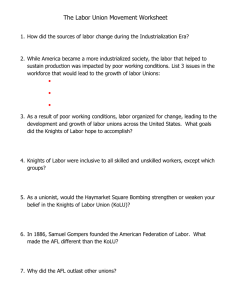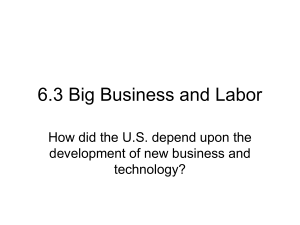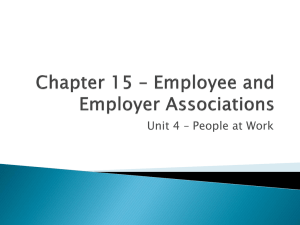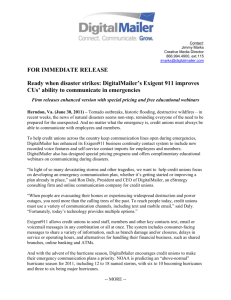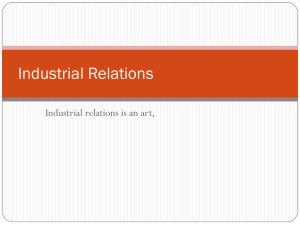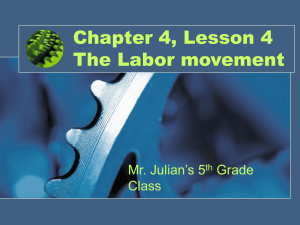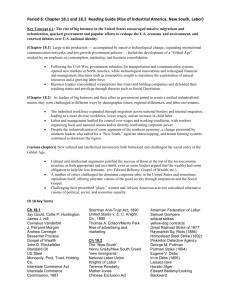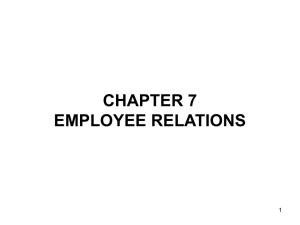Trade Union article - St Andrews & St Brides High School
advertisement
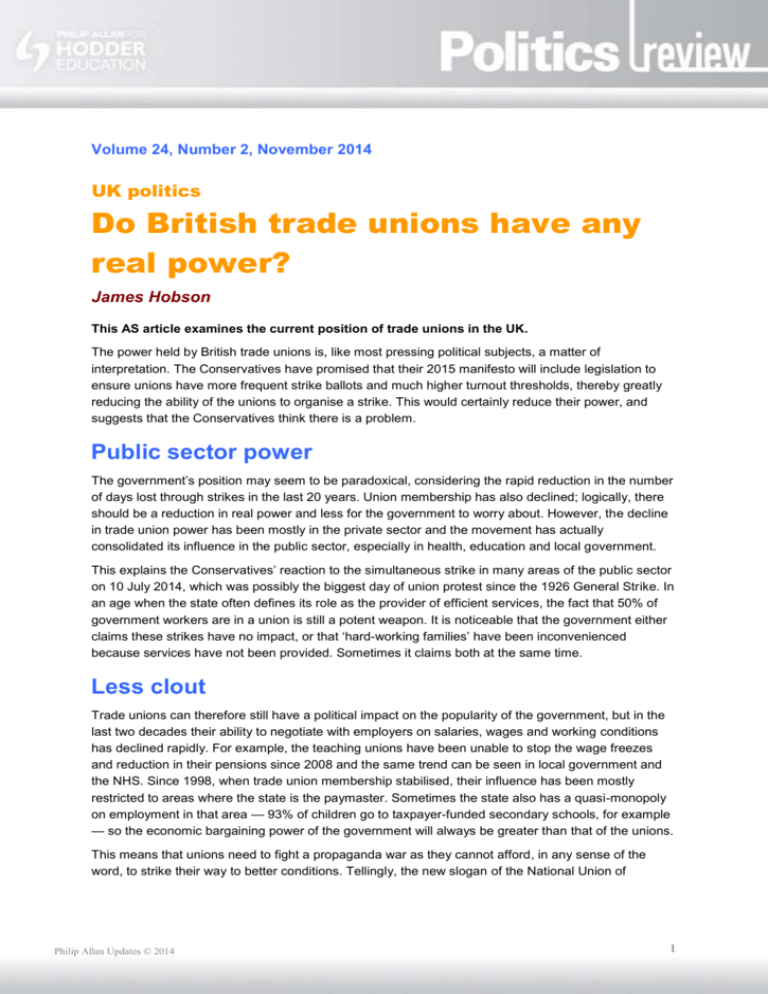
Volume 24, Number 2, November 2014 UK politics Do British trade unions have any real power? James Hobson This AS article examines the current position of trade unions in the UK. The power held by British trade unions is, like most pressing political subjects, a matter of interpretation. The Conservatives have promised that their 2015 manifesto will include legislation to ensure unions have more frequent strike ballots and much higher turnout thresholds, thereby greatly reducing the ability of the unions to organise a strike. This would certainly reduce their power, and suggests that the Conservatives think there is a problem. Public sector power The government’s position may seem to be paradoxical, considering the rapid reduction in the number of days lost through strikes in the last 20 years. Union membership has also declined; logically, there should be a reduction in real power and less for the government to worry about. However, the decline in trade union power has been mostly in the private sector and the movement has actually consolidated its influence in the public sector, especially in health, education and local government. This explains the Conservatives’ reaction to the simultaneous strike in many areas of the public sector on 10 July 2014, which was possibly the biggest day of union protest since the 1926 General Strike. In an age when the state often defines its role as the provider of efficient services, the fact that 50% of government workers are in a union is still a potent weapon. It is noticeable that the government either claims these strikes have no impact, or that ‘hard-working families’ have been inconvenienced because services have not been provided. Sometimes it claims both at the same time. Less clout Trade unions can therefore still have a political impact on the popularity of the government, but in the last two decades their ability to negotiate with employers on salaries, wages and working conditions has declined rapidly. For example, the teaching unions have been unable to stop the wage freezes and reduction in their pensions since 2008 and the same trend can be seen in local government and the NHS. Since 1998, when trade union membership stabilised, their influence has been mostly restricted to areas where the state is the paymaster. Sometimes the state also has a quasi-monopoly on employment in that area — 93% of children go to taxpayer-funded secondary schools, for example — so the economic bargaining power of the government will always be greater than that of the unions. This means that unions need to fight a propaganda war as they cannot afford, in any sense of the word, to strike their way to better conditions. Tellingly, the new slogan of the National Union of Philip Allan Updates © 2014 1 Teachers in its latest strikes, ‘Standing Up For Education’, doesn’t mention teachers’ conditions specifically. The 2008 financial crisis, the rise in unemployment and increased job market competition due to immigration have made it very difficult for the unions to wield power in the private sector. The Grangemouth dispute of November 2013 is a good example of how determined management and uncertain economic conditions can come together to damage the bargaining power of a relatively strong union. Trade unions were created during nineteenth-century British industrialisation to solve local, regional and then national disputes with employers. Unions have not yet developed a way of dealing with an increasingly global system where both capital investment and labour can move easily from country to country. Falling membership Membership of trade unions was 13 million when Margaret Thatcher became prime minister in 1979, but was less than 6 million in 2012. Most of the losses came from steel, mining and motor car manufacture — the same sectors that were powerful in the 1970s and which suffered from both Thatcher’s union legislation (the same laws that the present prime minister is promising to change) and the willingness to let the traditionally highly unionised manufacturing industries decline. However, most of the reduction in membership occurred in the period up to 1998, and trade unions remain some of the largest voluntary organisations in the United Kingdom, together dwarfing all the political parties. In September 2013 the right-leaning magazine The Spectator estimated Conservative Party membership at 134,000. ‘Super unions’ Trade unions amalgamated into ‘super unions’ such as UNITE and UNISON as economic and political conditions turned against them. Most of these amalgamations have been defensive; some have been successful. The Rail Maritime Transport Union (RMT) was formed by a merger of the National Union of Railwaymen (NUR) and the National Union of Seamen (NUS) and has had remarkable success in protecting some of their members. In October 2011, in the middle of national austerity and real wage freezes, the RMT was able to achieve a 5% pay increase for its members on the London Underground. This power was not the result of amalgamation or even the robust leadership of the late Bob Crow, but due to the fact that the conditions weakening other unions did not apply. The RMT has a quasimonopoly on rapid transport in London and can cause severe economic damage and maximum inconvenience to 8 million Londoners very easily. However, most unions do not have the opportunity to play their hand as well as the RMT. The future Trade union power will diminish if the Conservatives win in 2015 and stabilise if Labour is victorious. None of the 1980s trade union legislation will be repealed by Labour, and if austerity continues then collective bargaining power will not return. Ultimately, economics will be crucial in determining the Philip Allan Updates © 2014 2 amount of trade union power: a sustained recovery in the job market will improve the unions’ prospects much more than the actions or ideology of whichever party is in government. Learn more On public versus private sector strike record, see the following: www.dailymail.co.uk/news/article-2696195/Number-working-days-lost-strikes-doubles-year440-000-Tories-plot-union-crackdown.html For union membership, see the following: www.bbc.co.uk/news/business-19521535 James Hobson was formerly head of history and lead practitioner at Springfield School, Portsmouth. This resource is part of POLITICS REVIEW, a magazine written for A-level students by subject experts. To subscribe to the full magazine go to www.hoddereducation.co.uk/politicsreview Philip Allan Updates © 2014 3

